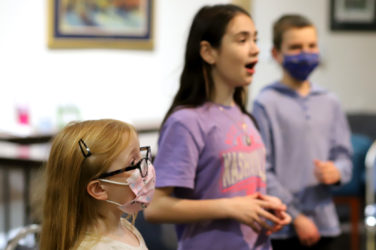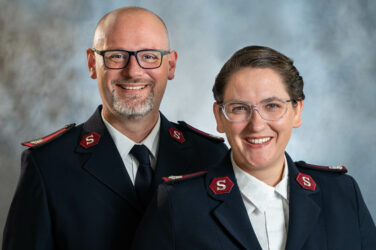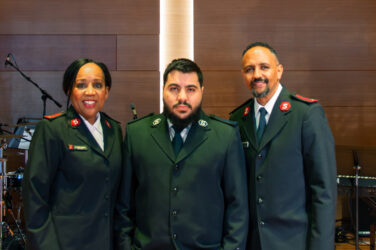by Patricia Sims

The Marketing Communications team of the Territorial Community Relations and Development Department recognizes the positive impact training and education have on the performance of the field (divisional and local level). They work collaboratively with National Headquarters to provide a variety of valuable behind-the-scenes support to the divisions, to protect the reputation of The Salvation Army, and to assist with implementation of national campaigns and messaging. Working closely with other U.S. territories, they identify opportunities and potential threats that could affect the organization.
“The world is always changing, and we have to adapt and pivot,” said Senior Director of Marketing Communications Brandi Meiner. “My team has a birds-eye view of what’s taking place across The Salvation Army and monitors the public’s perception about us. This information is crucial to the divisional communications leads, and we try to provide them with the tools to be successful.”
Territorial Headquarters (THQ) facilitates monthly virtual meetings with divisional communications leads 8to share challenges and successes and to brainstorm new ideas.
“We’re always learning and growing together,” said Brandi. “My team exists to provide guidance and support, and to identify when it’s necessary to bring in other departments or resources to help the field…This can include offering highly specialized educational sessions, like the recent media training.”

Although many officers have experience with public speaking, the media landscape has changed significantly. With online news, journalists must produce a higher volume of material faster. Unfortunately, accuracy and providing two sides to a story often fall by the wayside. This has been a double-edged sword for The Salvation Army.
“It’s not unusual for an online newspaper to share a press release we provided in its entirety because they’re always looking for fresh content. But that also means that officers must be ready to participate in interviews with little notice—especially during a crisis,” said Brandi. “It can be challenging for us to locate officers who are comfortable answering questions in real time, so we needed to turn that around. If we don’t respond quickly, we might lose the opportunity to communicate our position or provide important, clarifying details.”
As a result, a formal media training opportunity was hosted by THQ in April—the first in several years—and led by LERMA/, The Salvation Army’s national advertising agency. It was designed to help 32 officers throughout the territory prepare for local, divisional and potentially national media appearances.
The training included a classroom style presentation and mock interviews with feedback. LERMA/ covered best practices surrounding interviews, Zoom calls, how to predict media questions, avoid common traps, and deliver key messages. Equally important, they learned how to steer a conversation back on track if the media tries to take it off course.

“Our long-term goal is to grow the pool of officers throughout the Central Territory who can rapidly and confidently respond to interview requests. Our hope is to offer it on an annual basis and open it up to more officers and staff members,” said Brandi.
The Marketing Communications team also oversees branding, digital fundraising, email marketing, website development, social media and public relations. Their efforts play a crucial role in attracting sponsors and volunteers, maintaining strong donor relationships, educating the public about our services, and encouraging people to have a relationship with Christ.
Given this large scope, THQ hosts an annual marketing communications meeting to review these topics in depth with divisional communication leads and their staff. This year’s meeting in July was comprised of internal speakers and service providers who presented information, shared updates and answered questions. It’s a good networking and fellowship opportunity, too.
Brandi concluded, “Through our collective experience, everyone will expand their knowledge base and gain a deeper understanding of The Salvation Army’s role in the communities we serve…Unity is strength; collaboration is power.”





